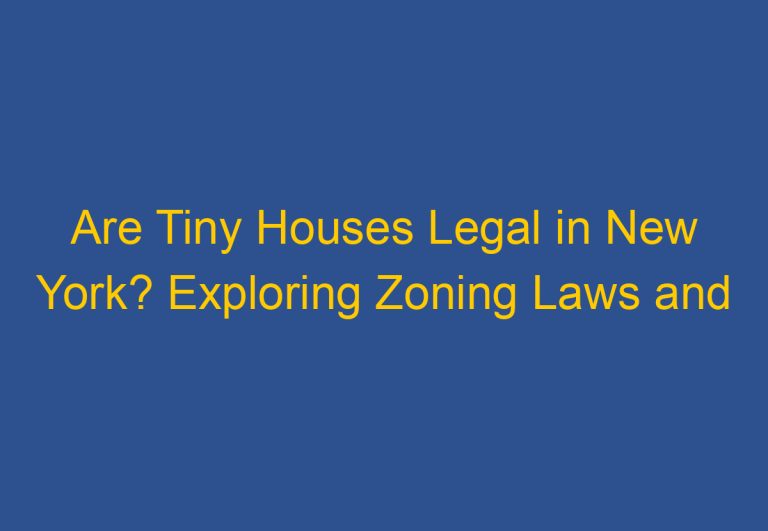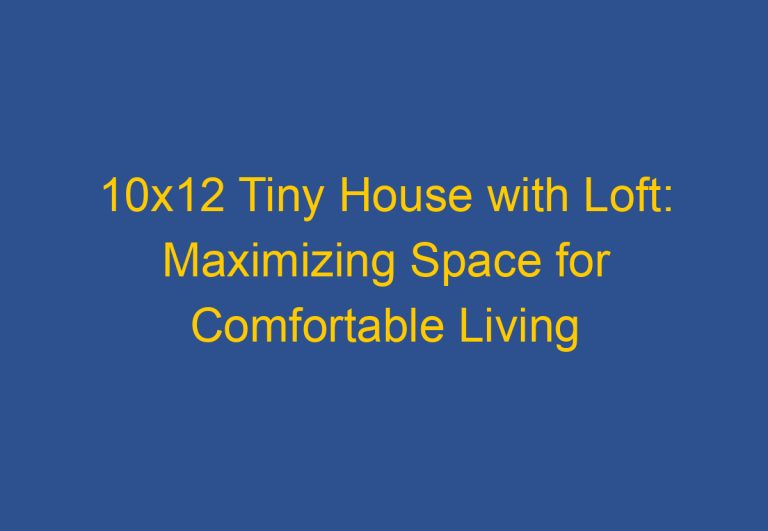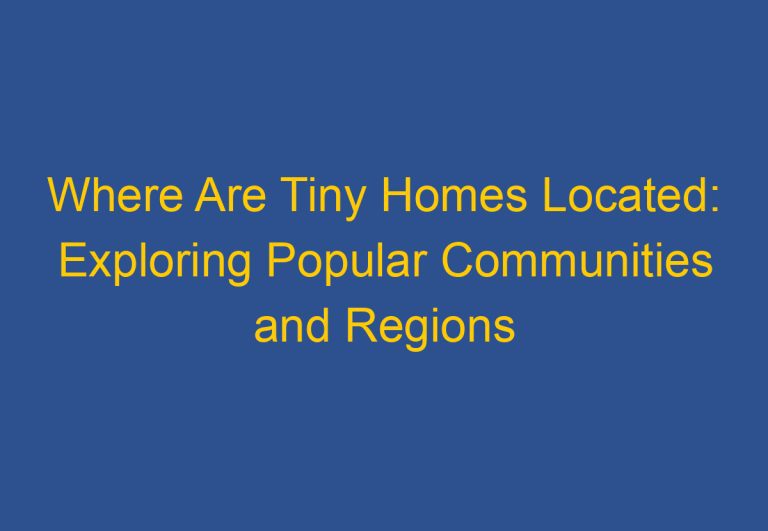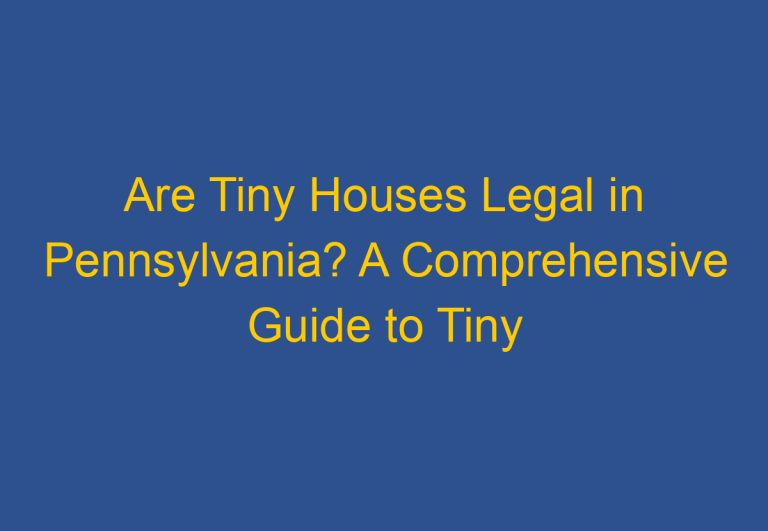Are Tiny Houses Legal in Colorado? Everything You Need to Know
Tiny houses have been gaining popularity among people who want to downsize and live a minimalist lifestyle. However, before investing in a tiny house, it is important to know the regulations and laws surrounding them in your state. In Colorado, tiny houses are legal, but there are certain rules and regulations that must be followed.
According to Colorado’s definition, a tiny house can have a square footage ranging from 100 to 400 square feet. However, any house smaller than 1,000 square feet is also considered a tiny house in this area. It is important to note that each county has specific regulations and zoning requirements for tiny houses, so it is crucial to research and understand the rules before building or purchasing a tiny house in these areas.
In 2022, the Colorado State bill HB22-1242 was passed, which officially made tiny houses, even on wheels, legitimate real property in Colorado. However, they must be classified as residential improvements for the purpose of property tax. Living in a tiny house full-time is largely dependent on the zoning laws and regulations of the county you are in. Therefore, it is necessary to contact the county officials to know the specific rules regarding tiny houses.
Legality and Zoning Regulations in Colorado
Statewide Building Codes and Tiny House Regulations
In Colorado, tiny homes are legal as long as they meet the state’s building codes and regulations. The Colorado Revised Statute (C.R.S 24-32-3300-3329) provides guidelines for non-residential and residential factory-built structures and tiny homes, including sellers of manufactured homes and tiny homes. However, the regulations and zoning laws vary by city and county, so it’s important to check with the local government and building codes department before building or living in a tiny home.
Zoning Laws and Local Ordinances
Zoning laws and local ordinances determine where tiny homes can be placed and how they can be used. For instance, some areas have specific requirements for the size of the home, the foundation type, and the minimum square footage. In Park County, for example, tiny homes are allowed as long as they comply with the International Residential Code (IRC) and the International Building Code (IBC). El Paso County also allows tiny homes, but they must be built on a permanent foundation and meet the IRC and IBC requirements.
Tiny Houses on Wheels vs. Permanent Foundations
Tiny houses on wheels (THOWs) are considered recreational vehicles (RVs) and are subject to different regulations than tiny homes built on permanent foundations. In Colorado, THOWs are not allowed as permanent residences in most areas. However, some cities like Durango, Denver, Walsenburg, Lyons, and Woodland Park have allowed THOWs to be used as ADUs (accessory dwelling units) or temporary housing for guests.
In summary, the legality of tiny homes in Colorado depends on various factors such as building codes, zoning regulations, and local ordinances. It’s essential to consult with the local government and building codes department before building or living in a tiny home to avoid any legal issues.
Ownership and Living in a Tiny House
Living in a tiny house is a unique lifestyle that has grown in popularity over the years. Tiny homes are known for their affordability, mobility, and sustainable living. However, before one can live in a tiny house, there are several ownership and construction regulations that they must comply with.
Utilities and Services for Tiny Houses
When it comes to utilities and services, tiny house owners must consider their water, sewer, and electric needs. In Colorado, tiny houses must have a permanent connection to a water source and sewer system. They must also comply with the state’s electric codes. Tiny house owners can opt for off-grid options, but they must ensure that their systems are safe and meet the state’s standards.
Compliance and Inspections
Building a tiny house in Colorado requires a building permit and compliance with the state’s building codes. Tiny house builders must ensure that their homes meet the state’s minimum square footage requirements, which range from 100 to 400 square feet. Additionally, tiny houses must pass inspections to ensure that they are safe and up to code.
Affordable Housing and Community Impact
Tiny houses have been touted as a solution to the affordable housing crisis. In Colorado, tiny homes can be used as accessory dwelling units or parked in RV parks. However, their impact on the community must be considered. Tiny house owners must pay property tax, and their homes must be located in areas that allow for their installation.
Overall, living in a tiny house in Colorado is legal, but it requires compliance with the state’s regulations. Tiny house owners must ensure that their homes meet the state’s building codes, comply with utility and service regulations, and consider their impact on the community. Tiny houses provide an affordable housing option and a unique lifestyle for those looking to downsize.
Frequently Asked Questions
What are the zoning regulations for tiny houses in Colorado?
Zoning regulations for tiny houses in Colorado vary by county and municipality. Some areas have specific zoning regulations in place that allow for tiny houses, while others do not. It is important to research the zoning regulations in your area before building or living in a tiny house.
Can you legally live in a tiny house on your own land in Colorado?
Yes, it is legal to live in a tiny house on your own land in Colorado, as long as the house meets all building codes and zoning regulations. However, it is important to note that some counties and municipalities may have additional regulations in place that must be followed.
What is the minimum square footage required for a dwelling in Colorado?
According to Colorado building codes, there is no minimum square footage requirement for a dwelling. However, some counties and municipalities may have their own minimum square footage requirements.
Which Colorado counties have embraced tiny house living?
Several Colorado counties have embraced tiny house living, including Park County, El Paso County, and Boulder County. However, it is important to research the specific regulations in each county before building or living in a tiny house.
How does Park County, Colorado regulate tiny houses?
Park County, Colorado has specific regulations in place for tiny houses, including a minimum square footage requirement of 220 square feet and a maximum height of 13.5 feet. Additionally, all tiny houses in Park County must be connected to a septic system and have a permanent foundation.
What legislation affects tiny house living in Colorado?
There is currently no specific legislation in Colorado that addresses tiny house living. However, there are building codes and zoning regulations that must be followed in order to build and live in a tiny house. It is important to research these regulations before beginning any construction or living in a tiny house.










